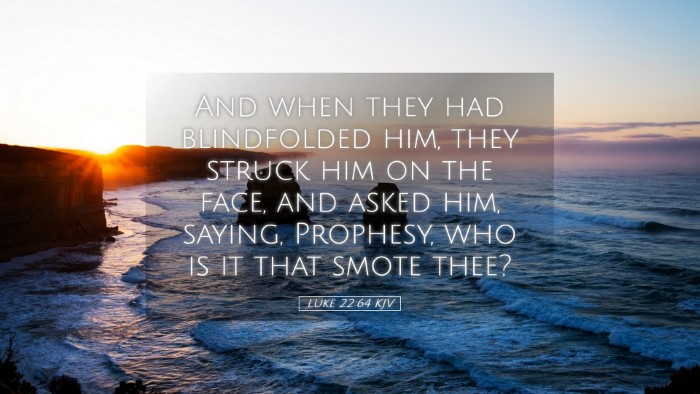Commentary on Luke 22:64
Luke 22:64 states: “And when they had blindfolded Him, they struck Him on the face and asked Him, saying, 'Prophesy! Who is the one who struck You?'” This verse is pivotal in the narrative of Christ's suffering and the mockery He endured before His crucifixion. The insights derived from public domain commentaries provide a rich tapestry of understanding surrounding this verse.
Contextual Analysis
This event occurs during the trial of Jesus, a moment where His identity and divine authority are unmistakably challenged. Leading up to this scene, Jesus had faced betrayal from Judas Iscariot, arrest in the garden, and an initial interrogation by the high priest.
Examination of Historical Context
Matthew Henry notes that this act of blindfolding Jesus symbolizes the spiritual blindness of His accusers. In their mockery, they fail to recognize His divine nature, and their actions reflect a broader theme of the rejection of Christ by the religious leaders of Israel.
Theological Implications
Albert Barnes highlights the implications of this scene in relation to prophecy and fulfillment. The demand for Jesus to prophesy while blindfolded illustrates the severe ridicule and challenge to His prophetic authority. Barnes emphasizes the irony that the very One who could accurately foretell the future is mocked by a question deriving from ignorance and disbelief.
Responses of the Actors
The Accusers
The actions of those striking Jesus reveal their hardened hearts. Adam Clarke points out that this encapsulates the broader human condition; it shows how people, when driven by malice, often dishonor truth. Clarke argues that the physical violence inflicted upon Jesus serves as a reflection of humanity's spiritual state—their inability to see Him for who He is.
The Suffering Servant
The manner in which Jesus remained silent in the face of such insult illustrates the fulfillment of Isaiah 53:7, where it is prophesied that the Messiah would be led as a sheep to the slaughter, yet would not open His mouth. This profound silence is pivotal as it underscores His role as the Suffering Servant. Matthew Henry describes this as a moment that magnifies the patience and humility of Christ, embodying the ultimate sacrificial love for humanity even in the face of severe injustice.
Spiritual Lessons
The verse teaches valuable lessons for the faithful. Albert Barnes suggests that Jesus' experience calls believers to a life of humility and trust in God amid suffering. He notes the importance of recognizing that while they may face mockery and scorn for their faith, they are to mirror Christ's composure and confidence in God’s ultimate plan.
Endurance in Faith
Adam Clarke encourages believers to reflect on the nature of their own faith in trials. He reminds readers that Jesus faced the worst human conditions and remained faithful. For pastors and theologians, this offers profound implications when counseling congregations or individuals facing ridicule and trials for their faith. The attitude of Christ inspires a framework of enduring faith.
Application for Today
Understanding Luke 22:64 invites reflection on activism against injustice and standing firm in one’s beliefs despite societal pressures. Matthew Henry encourages modern readers to remain steadfast in truth, particularly when confronted with disbelief or hostility.
Responses to Mockery
In light of the actions of Jesus, pastors can draw lessons on how to guide their congregations in responding to mockery or contempt. Albert Barnes prompts leaders to teach the importance of responding to hostility with grace rather than retaliation, reflecting Jesus’ example of silent strength.
Conclusion
Luke 22:64 serves as a deeply moving account of the suffering of Christ and challenges believers today to reflect on their responses to suffering and mockery. Through the insights of Matthew Henry, Albert Barnes, and Adam Clarke, we uncover rich theological, spiritual, and practical lessons that resonate with the heart of the Christian faith.
As we contemplate this passage, let us strive to embody the grace and dignity of Christ, standing firm in our identity as followers of the divine Messiah, even amidst trials.


